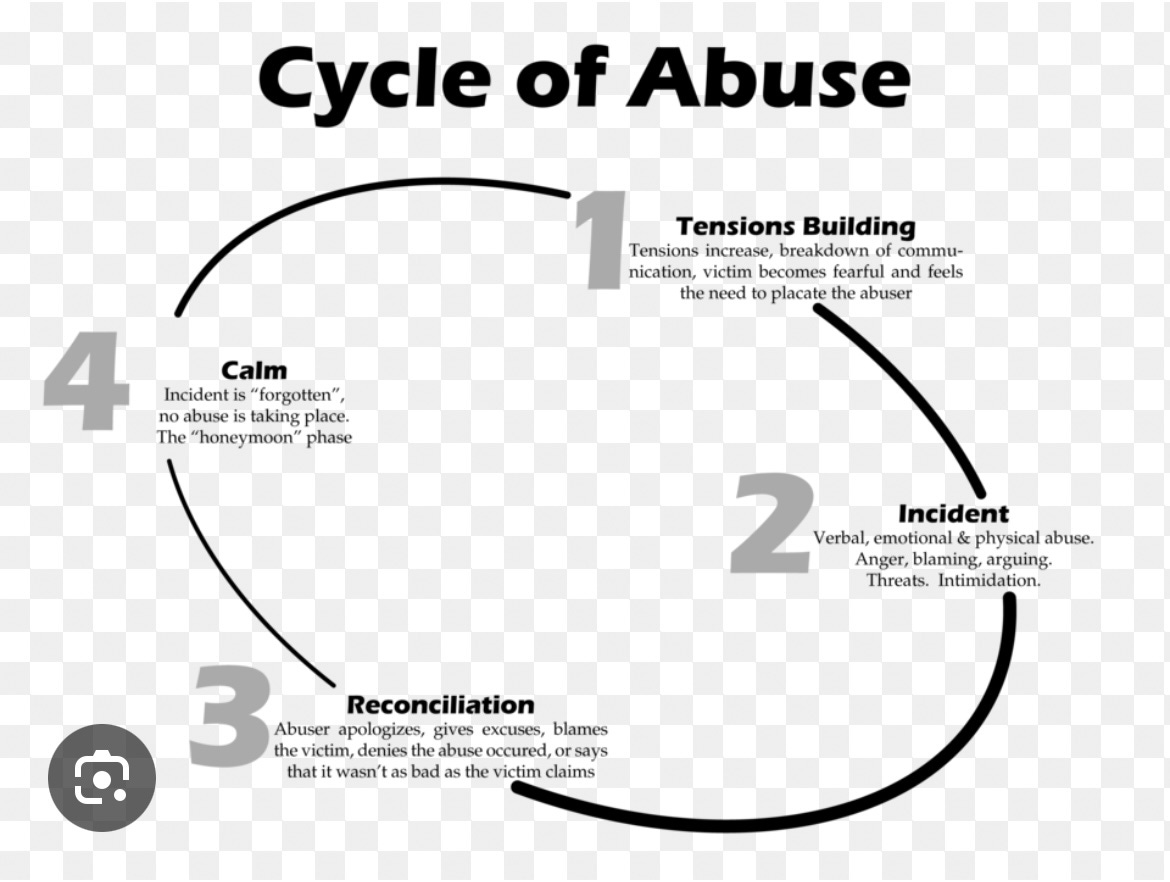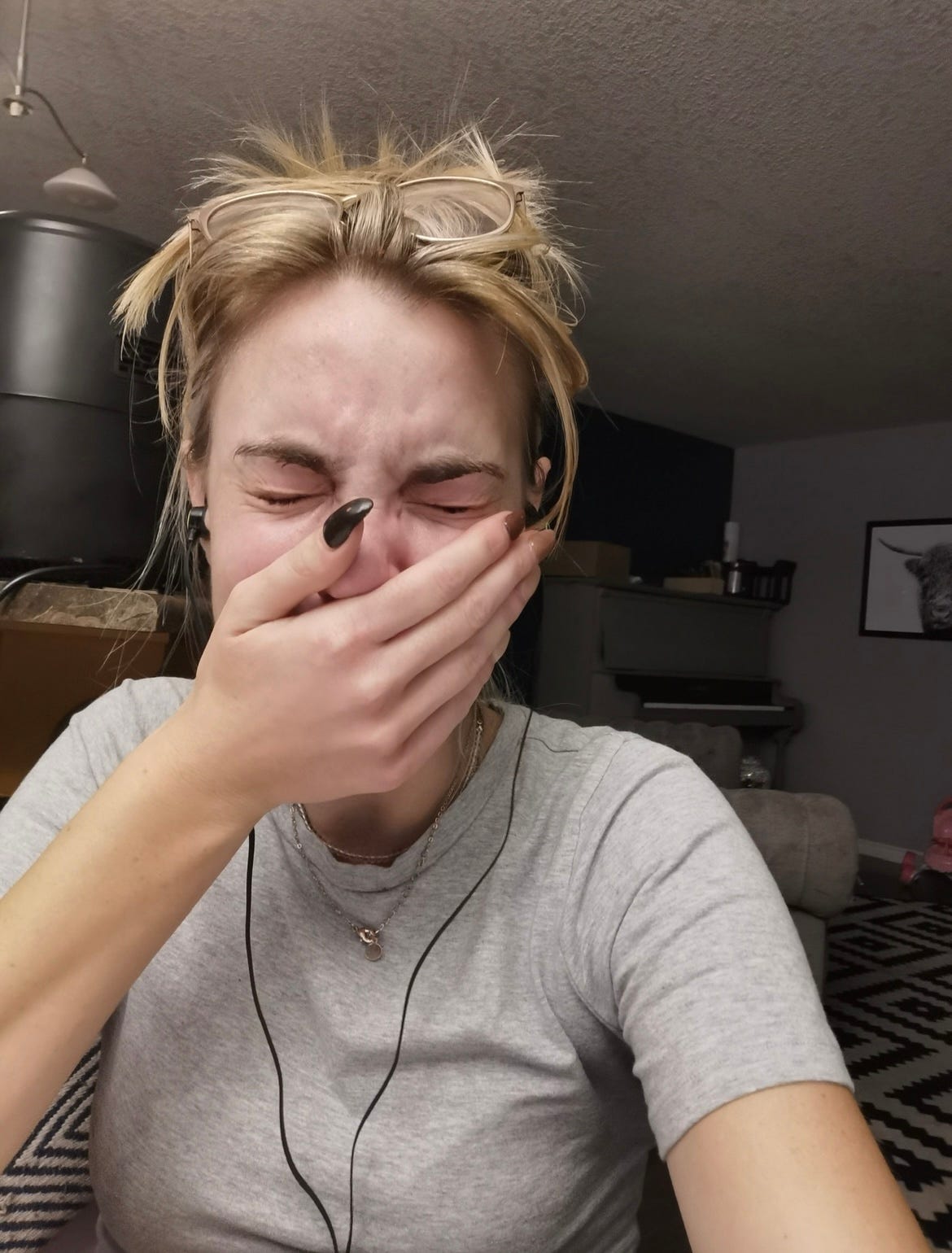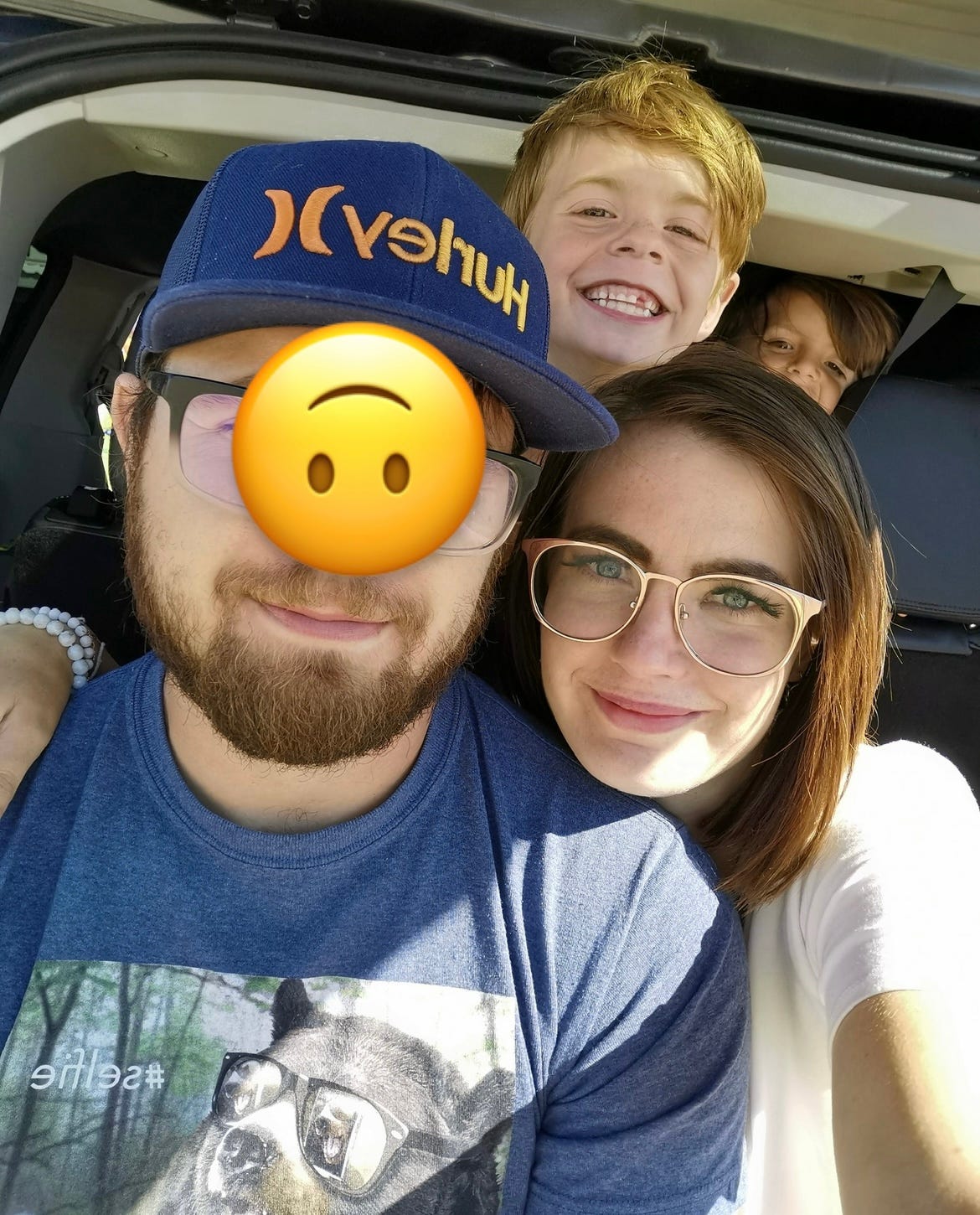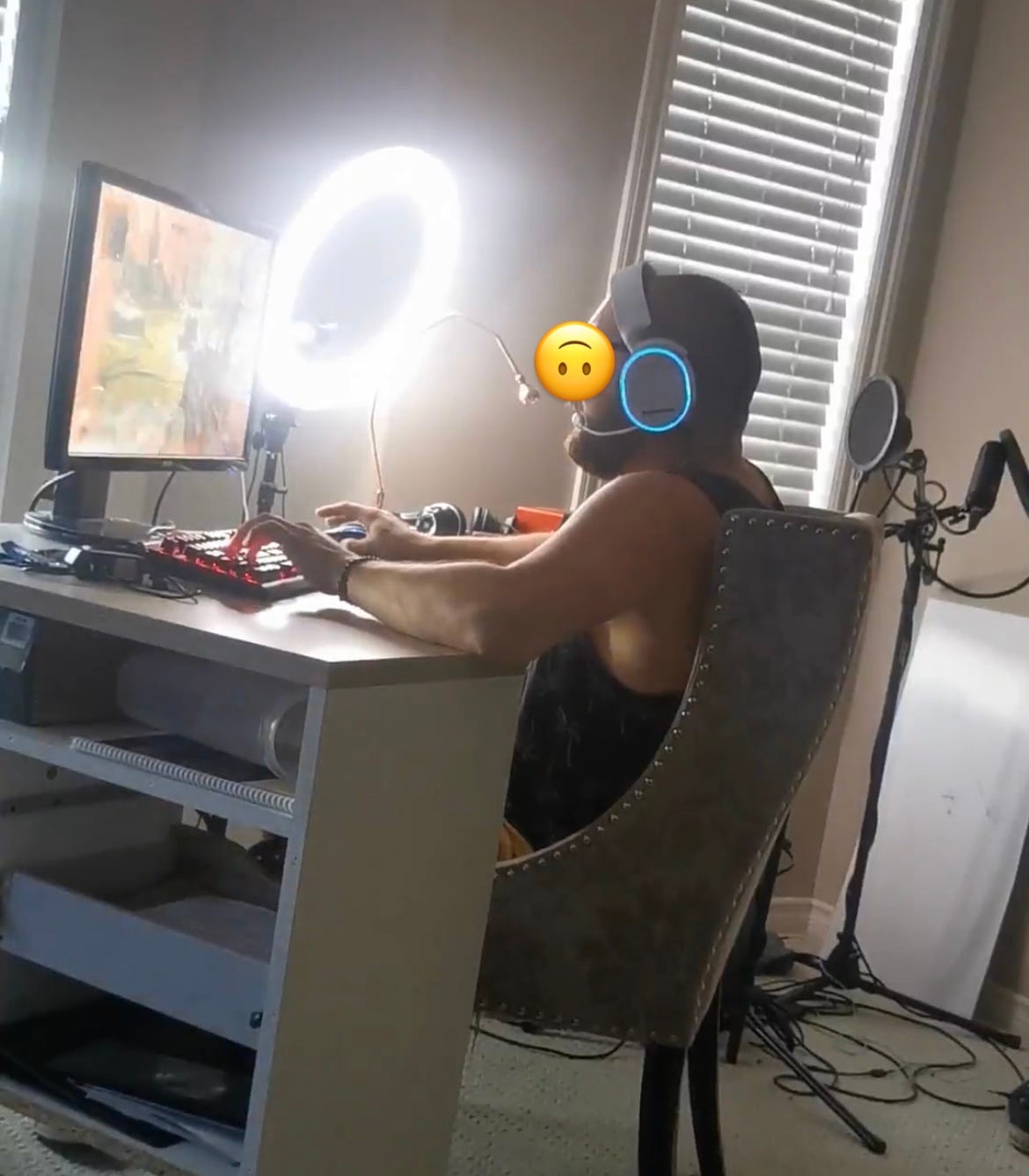I Got in the Lifeboat
How I stopped rewriting his story and started living mine.
Doomscrolling might’ve saved my life.
I know, I know. We’re supposed to log off. Touch grass. Romanticize our lives instead of melting into our screens. But let’s be honest, sometimes you don’t have the luxury of a romantic life to romanticize. Sometimes, the phone is the only thing that feels safe in your hands.
But it’s not love.
It’s the eye of the hurricane.
It was 2021, and I was stuck. Not visibly, not in the way people talk about when they say “you should just leave.” I was functioning, smiling, posting photos, making dinner, dying inside.
And then, during a drive in the truck headed toward the acreage he wanted to move and seclude me in, in the middle of one of those empty scrolls we all pretend not to do - I saw it.
A graphic. Just a little infographic someone had reposted.
Titled:
"The Cycle of Abuse."
And everything in me stopped. My thumb froze mid-scroll, and I stared. The wheel spun in my brain like a carousel I hadn’t realized I’d been riding for years. Tension building. The blow-up. The apology. The fake calm. Repeat. Over and over. I wasn’t just looking at a diagram, I was looking at my life on a loop.
Subconsciously, I didn’t want it to be true. I wanted to scroll away, tell myself it was dramatic, exaggerated, didn’t apply. But consciously? I knew. Immediately. Viscerally. Deep in my gut where the truth has always lived, even when I’ve tried to bury it.
I saw myself. I saw him. I saw the apologies that came with gifts, the good weeks that felt like breathing after drowning, the way I’d start counting days until the next explosion. I saw the way I minimized it. The way I made excuses for it. The way I thought love was supposed to hurt a little.
That Facebook post didn’t have flashing lights. It wasn’t poetic. It was just true.
And it changed everything
Because the highs?
The highs make you believe you were wrong for ever thinking it was abuse.
They feed you just enough to keep you tethered. They fill you with guilt. You start asking yourself impossible questions like:
“Maybe I was too emotional.”
“Maybe I did provoke it.”
“Maybe this is what real relationships are like.”
You start rewriting the story for them, gaslighting yourself before they even have to. That’s how deep it runs.
And once you doubt your own reality, they don’t have to work very hard to convince you of anything. You’re already spun, already stuck, already trained to question your memory, your feelings, your instincts. That’s where the real control lives. Not in the yelling or the threats or the slammed doors, but in the quiet erosion of your trust in yourself.
And the lows?
You don’t even know if you’ll survive the next hour.
You’re exhausted from holding it all together, doing the tasks, making it look normal, keeping the peace. You walk on eggshells so carefully you forget what solid ground feels like. You make yourself smaller and smaller, hoping invisibility will save you - hoping the wall absorbs the punch this time instead of your body.
Hoping his rage sees right past you.
And then comes the apology.
The abuser finally gives you everything you’ve been begging for - not grand gestures, not diamond rings or trips to Italy. No, it’s the little things that hit the hardest. The things you should be able to expect from someone who loves you.
He remembers your McDonald’s order. Brings you flowers after work. Does the laundry without being asked. Tells you to rest instead of running yourself into the ground, and for a second, you breathe. For a second, you believe.
For me, it was handwritten cards.
He knew I loved them. He knew how much I clung to words, to permanence, to something real. He used them like band-aids on bullet wounds, and I held onto each one like it was proof that the bleeding would finally stop.
I didn’t see them as tools of manipulation.
I saw them as hope.
I trusted every single time that this was the turning point.
This was the start of the version of him I knew he could be.
The version I was dying for.
The calm would last anywhere from an hour to two weeks. Sometimes I’d get a day of peace. Sometimes a week of pretending we were just….normal, happy, safe. The world was our oyster in this phase. We’d make plans. Laugh again. Dream about the future. Go out in public and look like the couple who had it all figured out. He’d touch my back gently in the grocery store, smile at me across the dinner table like nothing had ever happened.
And for a moment, I’d believe it.
I’d believe this was the real version of us, and all the rest was just stress, bad timing, misunderstandings, growing pains - anything but abuse. Because when it was good, it was good. That’s the thing no one tells you: the “calm” feels like love.
But it’s not love.
It’s the eye of the hurricane.
And then, like a light switch, it flips.
You never know what the trigger will be. A look, a tone or a dish left in the sink. Perhaps a joke he didn’t think was funny. One second you’re watching TV, the next you’re wondering how you got back here again, defending yourself, shrinking, apologizing for things you didn’t do, trying to remember what “normal” even feels like.
And the worst part?
You saw it coming.
You always do.
There’s a shift in the air. A stiffness in his body. A silence that lasts one second too long and you brace for it like a wave, thinking maybe if I stay still enough, quiet enough, soft enough, I can stop it from crashing.
But it always crashes.
And the cycle spins again.
Subconsciously, I didn’t want it to be true. I wanted to scroll away, tell myself it was dramatic, exaggerated, didn’t apply. But consciously? I knew. Immediately. Viscerally. Deep in my gut where the truth has always lived, even when I’ve tried to bury it.
I was in it for almost a decade.
Ten years of trying to claw my way back to myself, whatever pieces were left of her. Every time I tried to step into my authentic self, he knocked me back into submission. Literally.
Once, I sat next to a male friend at a group hangout, just laughing, just existing. When I got home, he threw a sand bucket at my head.
If I went out with friends or family, my phone lit up like a siren. Call after call. Text after text. Accusations disguised as guilt trips. “I guess I’m just not as important.” “You’re probably with someone else.” “Why even bother coming home?”
He demanded I work a full-time job to “pull my weight,” but constantly reminded me he could do it better - from the chair, video game keyboard in hand, and when I started talking about working outside the house, he shut it down. He said he didn’t “trust other men,” and needed to “know where I was at all times.” It was never about trust. It was about control.
The walls in our home held the proof.
Fist-sized holes that whispered what I tried to hide.
The bedroom door bowed in from being punched again and again, while I stood frozen, pinned to the wall by his rage, begging some silent part of me to do something.
Anything.
Before I didn’t make it out.
In six days, on August 5, 2025, it will be four years since I stepped out of the cycle of abuse.
Four years since I chose the terrifying unknown over the familiar violence.
Back then, it felt like standing at the edge of an unsailed ocean, and I was an unskilled sailor - no map, no compass, just the wreckage of what I’d survived and the aching hope that there had to be more.
But I got in the lifeboat anyway.
Shaking, barely breathing but moving.
I set sail back to me.








The courage you show to be yourself is so inspiring Breanna ✨️ ❤️
I am so happy you had the strength.